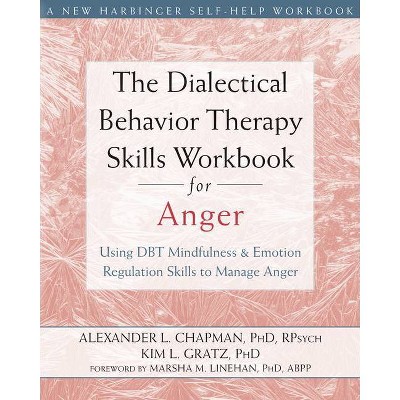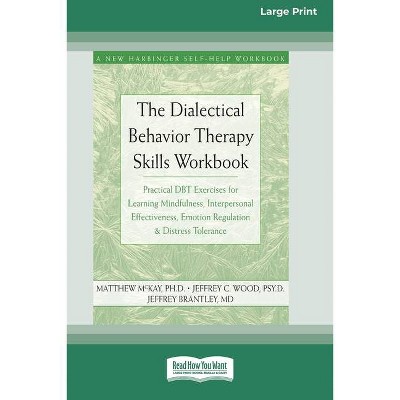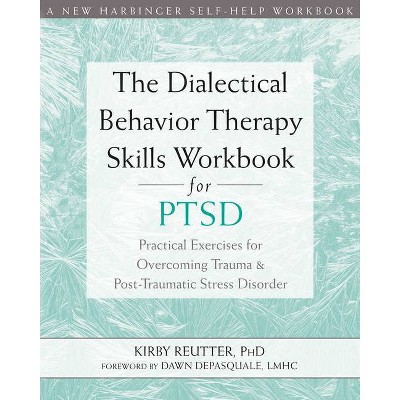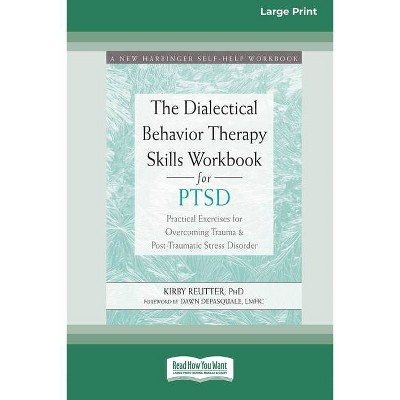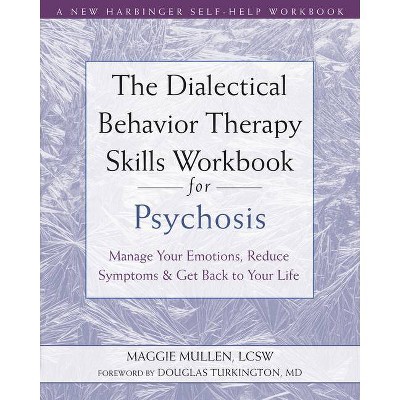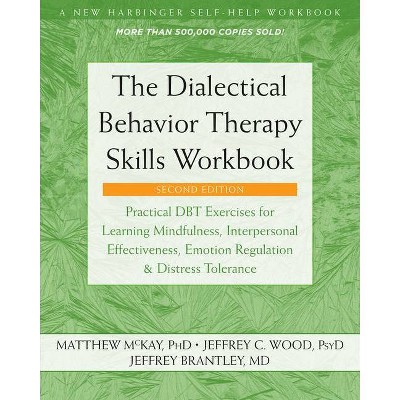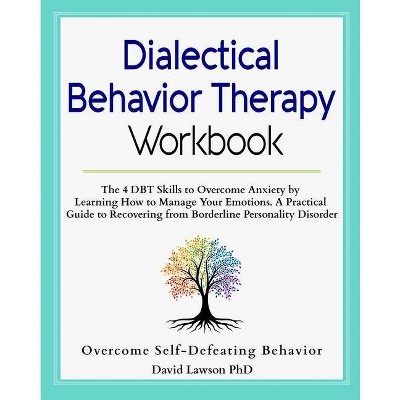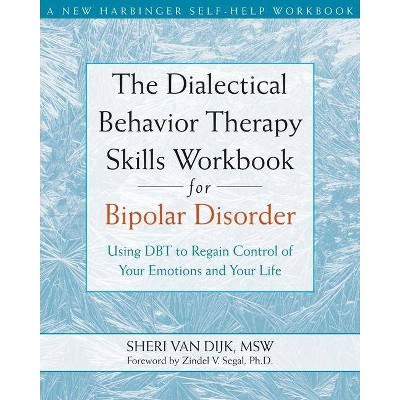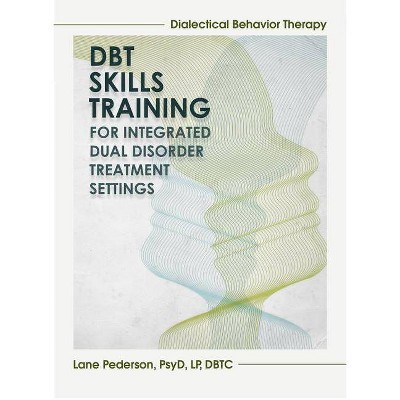The Dialectical Behavior Therapy Skills Workbook for Anxiety - by Alexander L Chapman & Kim L Gratz & Matthew T Tull (Paperback)
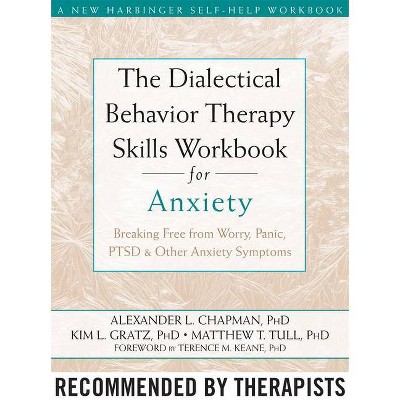
Similar Products
Products of same category from the store
AllProduct info
<p/><br></br><p><b> About the Book </b></p></br></br><P>The Dialectical Behavior Therapy Skills Workbook for Anxiety adapts the powerful dialectical behavior therapy (DBT) program for the treatment of anxiety and anxiety-related conditions. This book provides readers with the practical DBT skills and strategies they need to manage their anxiety and live more balanced lives.<p/><br></br><p><b> Book Synopsis </b></p></br></br><p>If you have an anxiety disorder or experience anxiety symptoms that interfere with your day-to-day life, you can benefit from learning four simple skills that therapists use with their clients. These easy-to-learn skills are at the heart of dialectical behavior therapy (DBT), a cutting-edge therapeutic approach that can help you better manage the panic attacks, worries, and fears that limit your life and keep you feeling stuck.</p><p>This book will help you learn these four powerful skills: </p><ul><li>Mindfulness helps you connect with the present moment and notice passing thoughts and feelings without being ruled by them.</li><li>Acceptance skills foster self-compassion and a nonjudgmental stance toward your emotions and worries.</li><li>Interpersonal effectiveness skills help you assert your needs in order to build more fulfilling relationships with others.</li><li>Emotion regulation skills help you manage anxiety and fear before they get out of control.</li></ul><p>In <i>The Dialectical Behavior Therapy Skills Workbook for Anxiety</i>, you'll learn how to use each of these skills to manage your anxiety, worry, and stress. By combining simple, straightforward instruction in the use of these skills with a variety of practical exercises, this workbook will help you overcome your anxiety and move forward in your life.</p><p><i>This book has been awarded The Association for Behavioral and Cognitive Therapies Self-Help Seal of Merit -- an award bestowed on outstanding self-help books that are consistent with cognitive behavioral therapy (CBT) principles and that incorporate scientifically tested strategies for overcoming mental health difficulties. Used alone or in conjunction with therapy, our books offer powerful tools readers can use to jump-start changes in their lives.</i></p><p/><br></br><p><b> Review Quotes </b></p></br></br><br><p>"<em>The Dialectical Behavior Therapy Skills Workbook for Anxiety</em> is concise, well organized, easy to read, and will likely be a lifeline of relief for many people. Chapman, Gratz, and Tull do a marvelous job of detailing the specific tools of DBT that can truly help readers to help themselves become more positive, able to cope, and successful in their relationships."<br> --Denise D. Davis, PhD, clinical psychologist and founding fellow of the Academy of Cognitive Therapy</p><br><br><p> "Alexander Chapman and his colleagues have provided a much-needed, thorough resource in <em>The Dialectical Behavior Therapy Skills Workbook for Anxiety.</em> Offering DBT skills and emphasizing mindfulness practice, this book provides helpful information and practical worksheets, and will be a valuable tool for both people experiencing anxiety and the clinicians treating them."<br> --Sheri Van Dijk, MSW, RSW, psychotherapist in Ontario, Canada, and author of <em>The Dialectical Behavior Therapy Skills Workbook for Bipolar Disorder</em></p><br><br><p>"A clear, practical guide that combines evidence-based approaches with rich clinical wisdom. Filled with innovative and practical advice as well as lively metaphors and engaging case examples, this book is sure to help readers struggling with anxiety find a balance between acceptance and change. I highly recommend this book and these authors."<br> --Lizabeth Roemer, PhD, coauthor of <em>The Mindful Way Through Anxiety</em></p><br><br><p>"For many, the struggle to control anxiety can be an exhausting, consuming, and seemingly endless challenge. Fortunately, <em>The Dialectical Behavior Therapy Skills Workbook for Anxiety</em> offers a number of well researched, easy to implement strategies that can help readers to better understand, accept, and manage their anxiety, improve their relationships, and engage more fully in their lives."<br> --Susan M. Orsillo, PhD, psychology professor at Suffolk University</p> <p></p><br><br><p>"I strongly recommend this self-help book for people suffering from various forms of anxiety. These authors effectively describe in lay terms how mindfulness, distress tolerance, emotion regulation and interpersonal effectiveness skills augment the more traditional applications of cognitive behavioral therapy strategies in the treatment of anxiety. In this book, the reader will find clinical vignettes, diagrams, and useful worksheets in this book that enhance the process of learning of these DBT tools." <br> --Alec L. Miller, PsyD, professor of clinical psychiatry and behavioral sciences at Albert Einstein College of Medicine in Bronx, NY</p><br><br><p>"Increasingly, research is showing that dialectical behavior therapy (DBT) can be a useful treatment for a range of mental health problems. In <em>The Dialectical Behavior Therapy Skills Workbook for Anxiety</em>, Chapman, Gratz and Tull strip away the jargon and walk the reader step-by-step through this treatment, showing the reader how to apply DBT skills to anxiety. This workbook will provide many anxiety sufferers with much-needed relief." <br> --David F. Tolin, PhD, ABPP, director of the Anxiety Disorders Center at the Institute of Living and author of <em>Face Your Fears</em></p><br><br><p>"This is an excellent application of dialectical behavior therapy (DBT) skills for people struggling with anxiety, panic attacks, and related problems. Not only will readers gain a better understanding of what these problems are, they'll also learn some very practical and effective skills to cope with them. Many thanks to the authors for bringing the success of DBT to people suffering with anxiety."<br> --John Forsyth, PhD, director of the Anxiety Disorders Research Program at the University at Albany, SUNY and author of <em>The Mindfulness and Acceptance Workbook for Anxiety</em></p><br><br><p>"Symptoms of anxiety, worry, and panic are integral to the emotional disorders and respond to a core set of psychological interventions. In this outstanding workbook, the authors pull together some of the most creative and scientifically-proven procedures for managing out-of-control emotions, including anxiety. These dialectical behavior therapy skills should benefit everyone suffering the ravages of anxiety disorders."<br> --David Barlow, PhD, professor of psychology and psychiatry and founder and director emeritus of the Center for Anxiety and Related Disorders at Boston University</p><br><br><p>"To be relieved of anxiety is often a person's highest priority for therapy. This book allows access to the powerful DBT methods that that can provide that relief. It is not always possible to join a DBT skills training group, but it is possible to understand and use Marsha Linehan's transformative work by reading this practical interpretation."<br> --Kate Northcott, MA, MFT, DBT therapist in private practice with Mindfulness Therapy Associates and director of New Perspectives Center for Counseling in San Francisco, CA</p><br><p/><br></br><p><b> About the Author </b></p></br></br><p>Alexander L. Chapman, PhD, is associate professor in the department of psychology at Simon Fraser University, a practicing registered psychologist, and president of the DBT Centre of Vancouver. He has published numerous articles and chapters on dialectical behavior therapy (DBT), trains professionals and students in DBT, and has coauthored books on behavior therapy, borderline personality disorder, and self-harm. In 2007, Chapman received a Young Investigator's Award from the National Education Alliance for Borderline Personality Disorder. In 2011, he received a Michael Smith Foundation for Health Research Award to support his work on borderline personality disorder, as well as a Canadian Psychological Association Early Career Scientist Practitioner Award for his work integrating research and treatment in DBT.</p> <p>Kim L. Gratz, PhD, is associate professor in the department of psychiatry and human behavior at the University of Mississippi Medical Center, where she serves as director of the dialectical behavior therapy clinic and director of personality disorders research. In 2005, Gratz received a Young Investigator's Award from the National Education Alliance for Borderline Personality Disorder. She has written numerous journal articles and book chapters on borderline personality disorder, deliberate self-harm, and emotion regulation, and is coauthor of <em>The Borderline Personality Disorder Survival Guide</em> and <em>Freedom from Self-Harm</em>.</p> <p>Matthew T. Tull, PhD, is associate professor and director of anxiety disorders research in the department of psychiatry and human behavior at the University of Mississippi Medical Center. He has published numerous articles and chapters on emotion regulation and anxiety disorders, with a particular emphasis on panic disorder, generalized anxiety disorder, and post-traumatic stress disorder. He received the Chaim and Bela Danieli Young Professional Award from the International Society for Traumatic Stress Studies in 2009, and the 2010 President's New Researcher Award from the Association for Behavioral and Cognitive Therapies for his research on post-traumatic stress disorder.</p> <p>Foreword writer Terence M. Keane, PhD, is associate chief of staff for research and development and director of the behavioral sciences division of the National Center for PTSD at the VA Boston Healthcare System. He is also currently president of the Anxiety Disorders Association of America.</p>
Price History
Cheapest price in the interval: 25.99 on October 22, 2021
Most expensive price in the interval: 25.99 on November 8, 2021
Price Archive shows prices from various stores, lets you see history and find the cheapest. There is no actual sale on the website. For all support, inquiry and suggestion messages communication@pricearchive.us
